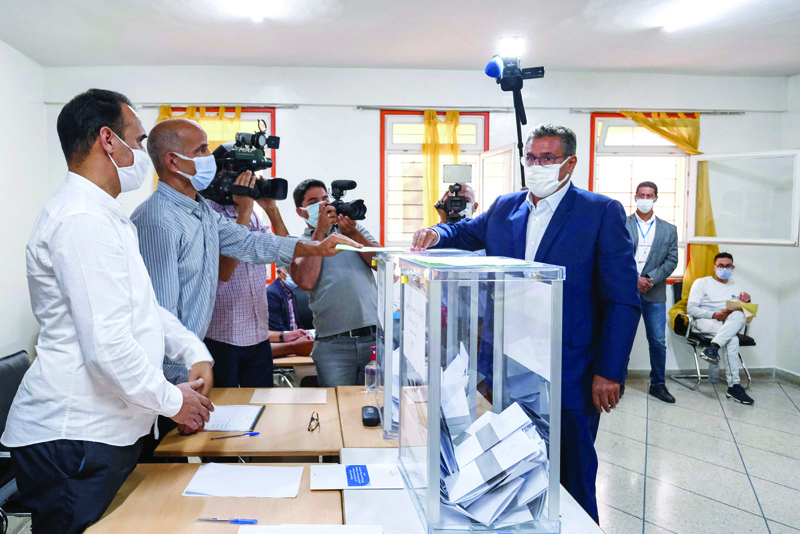 SALE, Morocco: Aziz Akhannouch, president of the National Rally of Independents (RNI), casts his ballot in Sale yesterday as Moroccans vote in parliamentary and local elections. - AFP
SALE, Morocco: Aziz Akhannouch, president of the National Rally of Independents (RNI), casts his ballot in Sale yesterday as Moroccans vote in parliamentary and local elections. - AFPRABAT: Moroccans were voting yesterday in parliamentary and local elections that will decide the fate of Islamists who have governed the kingdom since the Arab Spring uprisings. The vote comes as the tourism-dependent economy is making a patchy recovery from a pandemic-induced seven percent contraction last year, and enthusiasm is limited in a country where the monarchy retains key decision-making power.
"Everyone to the ballot boxes!" urged local daily newspaper the Economist, noting that turnout represented the "real stakes in today's polls" after only 43 percent of eligible voters cast ballots last time around in 2016. Polling stations opened at 8:00am local time and will close at 7:00pm. The vote was unfolding "in normal circumstances," the interior ministry said, and preliminary results were expected in the evening.
Eighteen million voters are on the electoral roll, and citizens will vote for 395 national lawmakers, alongside more than 31,000 local and regional officials. King Mohammed VI will name a prime minister from the party that leads the parliamentary poll to govern the nation of 36 million for the next five years. "Today is an important day for Morocco. I am voting because it is my duty," one voter said in a polling station in the economic capital Casablanca.
'Above suspicion'
Swept to power in the wake of the 2011 uprisings around the Middle East and North Africa, the Islamist Justice and Development Party (PJD) hopes to secure a third term leading a ruling coalition. Compared with demands back then for an end to "corruption and despotism", this year's two-week election campaign was less lively, with no large gatherings due to the coronavirus. In the final days, however, PJD and its close rival the National Rally of Independents (RNI) have exchanged heftier blows.
Former prime minister and PJD leader Abdelilah Benkirane attacked the RNI boss, billionaire businessman and Agriculture Minister Aziz Akhannouch, in a fiery Facebook video on Sunday. "The head of government must be a political personality with integrity who is above suspicion," he said. Akhannouch, who is said to be close to the royal palace, retorted in an interview on Monday that the attacks were "an admission of failure" by his opponents, vowing not to respond.
Following the last elections in 2016, the RNI leader secured critical ministerial jobs for his party, including the economy and finance and industry portfolios. Besides the PJD and RNI, the liberal Authenticity and Modernity Party (PAM), formed by an influential royal adviser, and the centre-right Istiqlal Party are both seen as front-runners in local media. The election campaign has been marked by PAM's allegations that RNI was buying votes - denied by Akhannouch's party - while PJD blasted excessive political spending without naming names.
The tepid campaign has frustrated some voters and expectations for turnout are low. Whatever the result, political parties are expected to adopt a charter for a "new model of development" with a "new generation of reforms and projects" in the coming years, the king announced recently. All parties are expected to sign up, regardless of who wins the election. The plan's major aims include reducing the country's wealth gap and doubling per-capita economic output by 2035. - AFP










